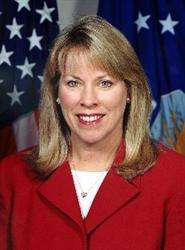Mary L. Walker

Mary L. Walker (born December 1, 1948) is an American lawyer who served as General Counsel of the Air Force during the presidency of George W. Bush. She gained notoriety for her role in a 2003 review by the United States Department of Defense of the so-called Torture Memos.
Life and career
Mary L. Walker was born in Dayton, Ohio on December 1, 1948.[1] She was educated at the University of California, Berkeley, receiving an A.B. in 1970.[1] She then attended both UCLA Law School and Boston University School of Law, receiving a J.D. in 1973.[1]
Walker joined the legal department of the Southern Pacific Transportation Company in 1973.[1] She worked there until 1976, when she joined the law firm of Richards, Watson, Dreyfuss & Gershon in Los Angeles.[1] She was made a partner in 1979, working there until 1982.[1]
In 1982, Walker moved to the United States Department of Justice as Principal Deputy Assistant Attorney General in the Land and Natural Resources Division.[1] From 1984 to 1985, she was the Deputy Solicitor of the United States Department of the Interior.[1] On September 18, 1985, President of the United States Ronald Reagan nominated her to be Assistant Secretary of Energy (Environment, Safety, and Health).[1] She subsequently held this office until 1988.[2]
She spent 1988-89 as Vice President of Law Environmental Inc.[2] She was a partner at Richards, Watson & Gershon in San Francisco from 1989 to 1991.[2] She was a partner of Luce, Forward, Hamilton & Scripps in San Diego from 1991 to 1994, and then at Brobeck, Phleger & Harrison in San Diego from 1994 to 2001.[2] She was also a U.S. Commissioner on the Inter-American Tropical Tuna Commission from 1988 to 1995.[2] An evangelical Christian, she participated in the founding of the San Diego Professional Women's Fellowship, a group related to Campus Crusade for Christ.
On September 26, 2001, President George W. Bush nominated Walker to be General Counsel of the Air Force. She held this office for the duration of the presidency of George W. Bush. As of 2009, she is the longest serving General Counsel in the history of the Department of the Air Force, and she received many awards during her tenure.
_General_Counsel_Mary_L._Walker%2C_holds_a_copy_of_the_report_on_the_US_Air_Force_Academy_(USAFA)_sexual_misconduct_study_released_June_19th_during_a_Pentagon_press_briefing_030619-F-FC975-085.jpg)
Role in Torture Memos Controversy
On January 15, 2003, as a result of concern expressed by the Army that more techniques were needed to interrogate the terrorists held at Guantanamo, the United States Secretary of Defense Donald Rumsfeld ordered a review of certain enhanced interrogation techniques authorized by the so-called Torture Memos of 2001.[3] Two days later, William J. Haynes, II, the General Counsel of the United States Department of Defense designated Walker as the head of an interdepartmental working group tasked with implementing the Secretary's request.[4] Walker extablished a committee of the senior lawyers in the Pentagon and a career-level working group of those with expertise in the substantive issues and additional techniques to be given legal and policy review.
The next week, Walker received an extensive legal memorandum, written in 2001, from the Office of Legal Counsel, authored by John Yoo and signed by Jay Bybee, the head of the Office of Legal Counsel. She was advised by William J. Haynes, General Counsel of the Department of Defense, that this legal analysis would be controlling. On January 23, 2003, General Counsel of the Navy Alberto J. Mora, a member of the senior legal group, reviewed a hard copy of that memorandum in Walker's office[5] (copies were not made widely available pursuant to instructions of William J. Haynes, General Counsel of the Department of Defense).[6] This led to a disagreement between Mora and the senior legal group. Mora believed that the memorandum displayed "catastrophically poor legal reasoning", but Walker agreed with Yoo's reasoning concerning the powers of the President.[7] Mora believed that Yoo's memo was "fundamentally in error." Walker encouraged discussion among the legal team and invited Yoo to the Pentagon to answer their questions, which he did on two occasions. Walker also encouraged Mora to share his views and to meet with General Counsel Haynes. Mora met with Haynes and circulated an opposing draft memo, entitled "Proposed Alternative Approach to Interrogations".[6] Haynes did not accept Mora's views, nor did any members of either the senior legal committee or the working group.
On March 6, 2003, by unanimous vote of all members (including the Navy), the senior legal group presented its recommendations to Secretary Rumsfeld for new techniques. These had been proposed by the technical working group and made subject to legal and policy review by the senior legal team. The recommendations to Secretary Rumsfelf deteremined that the reasoning behind the Department of Justice memorandum was sound, although group did not need to rely upon the more far-reaching conclusions of the Justice Department's memorandum.[8] The final report was presented on April 4, 2003.[9] Secretary Rumsfeld adopted the majority of the new techniques proposed. At the Administration's request, the Justice Department subsequently reviewed the Working Group's recommendations that were adopted and fully endorsed them.
References
- 1 2 3 4 5 6 7 8 9 Ronald Reagan: Nomination of Mary L. Walker To Be an Assistant Secretary of Energy, Sept. 18, 1985
- 1 2 3 4 5 Walker Military Biography
- ↑ Rumsfeld Memo to the Pentagon Counsel, Jan. 15, 2003
- ↑ Memo From the Pentagon Counsel to the General Counsel for the Air Force, Jan. 17, 2003
- ↑ Mary Walker Profile, CTA
- 1 2 From History Commons
- ↑ From History Commons,
- ↑ Dana Priest and R. Jeffrey Smith, "Memo Offered Justification for Use of Torture", Washington Post, June 8, 2004. A copy of the report is available here.
- ↑ Report of the Pentagon Working Group, April 4, 2003
| Government offices | ||
|---|---|---|
| Preceded by Jeh Johnson? |
General Counsel of the Air Force 2001 – 2008 |
Succeeded by Charles A. Blanchard |